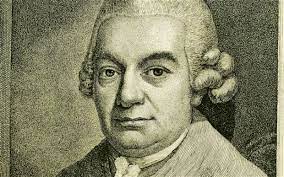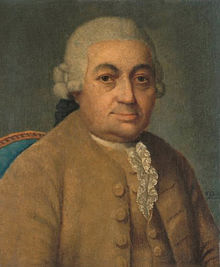Carl Philipp Emanuel Bach, renowned as one of the most influential composers of the Classical era, was born on March 8, 1714, in Weimar, Germany. He was the second surviving son of the illustrious Johann Sebastian Bach, a towering figure in Baroque music. Carl’s upbringing in a musically enriched environment, surrounded by his father’s compositions and collaborations, profoundly shaped his artistic inclinations.
From an early age, Carl displayed remarkable musical talent and received rigorous training from his father. He excelled not only in composition but also in keyboard and performance. At the age of ten, tragedy struck the Bach family with the death of Johann Sebastian’s first wife, Maria Barbara. Despite the personal turmoil, Carl continued his musical studies under his father’s guidance.
In his youth, Carl Philipp Emanuel Bach served as a court musician in Berlin, where he gained invaluable exposure to the works of leading composers of the time, including Carl Heinrich Graun and Johann Joachim Quantz. This experience broadened his musical horizons and contributed to the development of his unique style.
Bach’s compositions encompass a wide range of musical forms, including symphonies, concertos, sonatas, and keyboard music. His innovative use of harmonic progression, coupled with expressive melodies and intricate textures, distinguished him as a pioneer of the Classical period. His keyboard music, in particular, showcased his virtuosity and pushed the boundaries of conventional keyboard techniques.
In 1740, Bach accepted a position as a court musician in the service of Crown Prince Frederick of Prussia, later known as Frederick the Great. This period marked a significant phase in his career, as he composed numerous works for the flute, an instrument favored by the king. Bach’s compositions during his tenure in Berlin are characterized by their elegance, wit, and sophistication.
Following his time in Berlin, Bach held positions in various cities, including Hamburg and Frankfurt. His reputation as a composer and performer continued to grow, earning him widespread acclaim throughout Europe. He was also esteemed as a pedagogue, publishing influential treatises on keyboard playing and composition, which became essential texts for aspiring musicians.
Bach’s legacy extends beyond his compositions; his theoretical writings and pedagogical contributions played a crucial role in the development of Classical music. His emphasis on emotional expression and individuality paved the way for the Sturm und Drang (“Storm and Stress”) movement, which sought to evoke intense emotions through music.
Carl Philipp Emanuel Bach passed away on December 14, 1788, leaving behind a vast and diverse body of work that continues to inspire musicians and audiences alike. His compositions remain an integral part of the classical repertoire, embodying the spirit of innovation and creativity that defined the Classical era.


Comments are closed